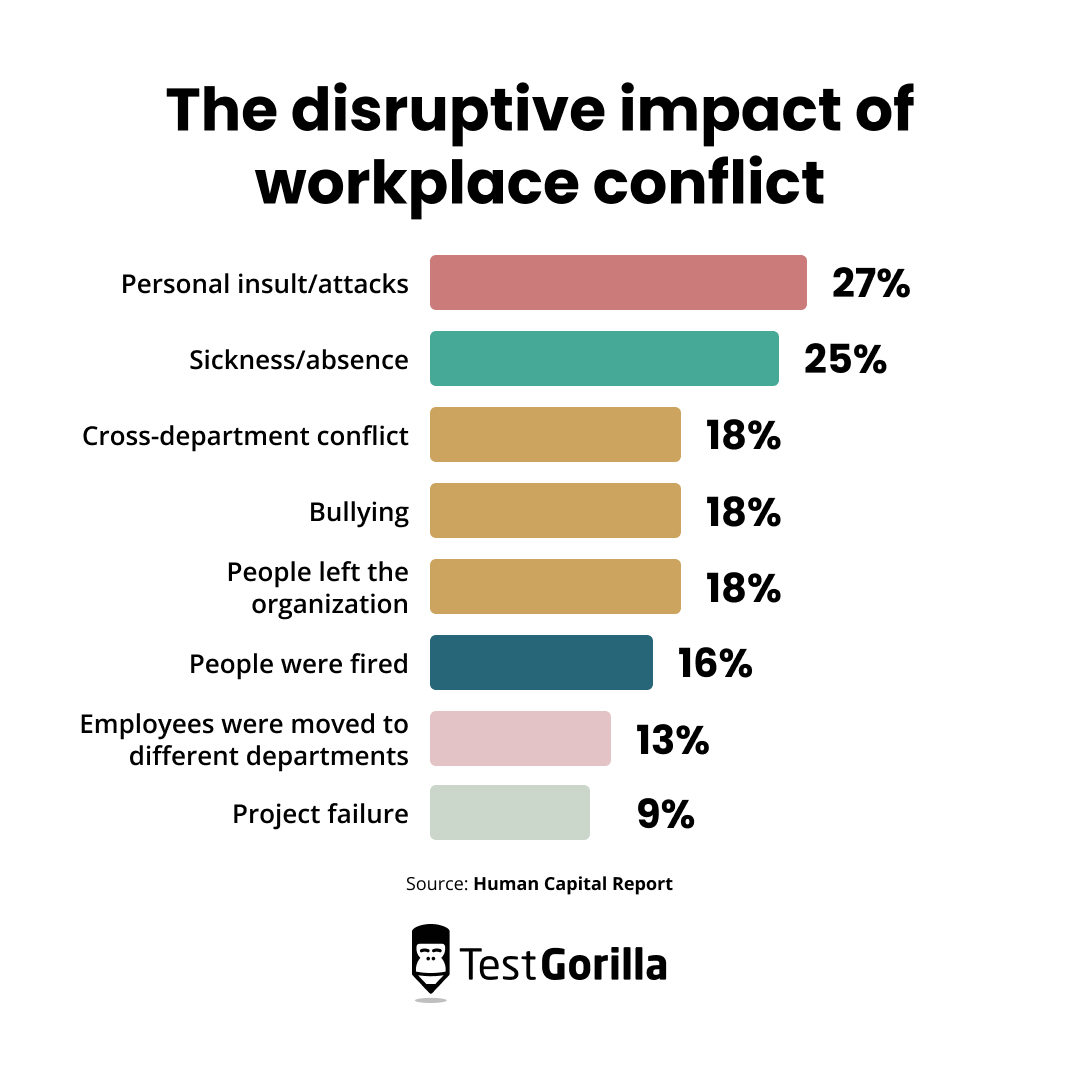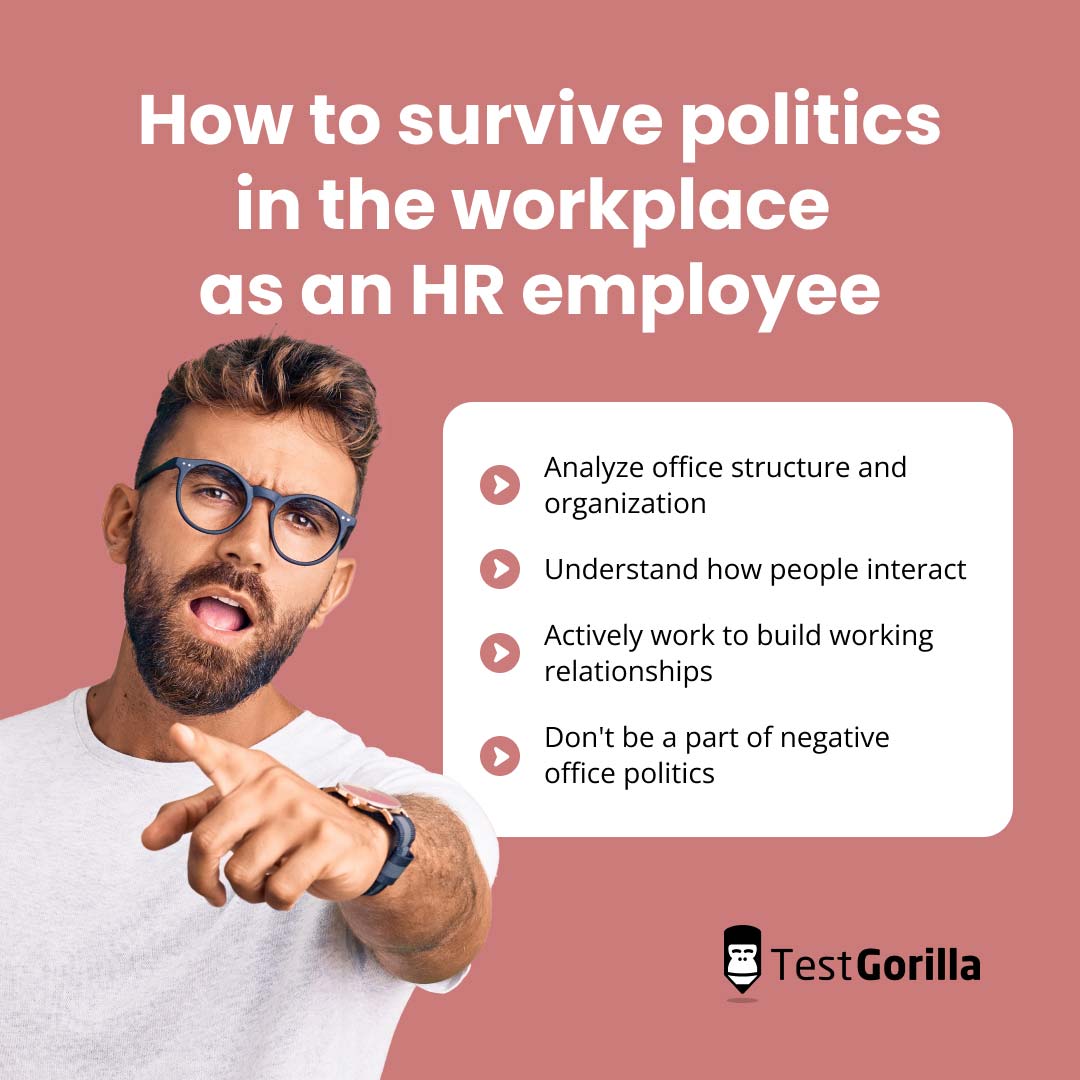No matter where you are, everybody has wants and needs, whether they be professional growth or social validation. Often, the desires of one person come into conflict with the desires of others, creating a complex web of motives and social formations.
Office politics, or the interplay between employees’ personal agendas, is an unavoidable reality in the workplace.
Workplace politics can motivate and unite people, but it typically leads to a conflict of interests that creates more negative effects on the workforce than positive ones.
When workers use their authority over others to further their own interests, those on the receiving end of their actions become anxious, unproductive, and unmotivated.[1]
Workplace politics can create a toxic culture, which is a great predictor of employee turnover. Nearly one in five Americans leave their job because of their workplace culture.[1]
You can’t escape or eliminate office politics. However, there are ways to mitigate its effects and use it to your advantage, whether you are a worker affected by it or an HR manager looking to manage it and create a healthy culture.
In this article, we look at examples of workplace politics, its positive and negative effects, and effective ways to navigate it and create a positive and inclusive culture.
Table of contents
- What is office politics?
- The positives of office politics
- The negative effects of workplace politics
- How to survive politics in the workplace as an HR employee
- How to deal with office politics and create positive change as an HR manager
- Use talent assessments to combat office politics and improve your workforce’s wellbeing
What is office politics?
Office politics refers to the social structures that govern a workplace, including the power, authority, and delegation employees use to further their agendas and get ahead.
It determines who has the power to influence the workplace and can function as a glue to hold the organization together. However, more often than not, it defines who has authority over others.
By “authority,” we mean more than just the official company hierarchy. Office politics can grant resourceful (though often conniving) employees of any status de facto authority through their abilities to build relationships and leverage the political landscape.
Despite its name, office politics exists in any environment. It’s present in blue- and white-collar companies and tends to be more common in competitive workplaces where individuals have to deal with scarce resources and have limited opportunities for advancement.
Examples of office politics
When many people hear the term “office politics,” they immediately assume it refers to office gossip and drama in their social networks. These can be workplace politics examples, but they are not the only types of office politics.
Positive office politics examples also exist. For instance, employees who gladly work with people outside their immediate team can prevent the formation of cliques.
More often than not, office politics has a negative connotation. Let’s explore a few examples of the different types of office politicians and the negative politicking they could engage in:
Type of office politician | Examples of negative office politics |
Gossip spreader | A receptionist uses tidbits about coworkers’ personal lives to gain an advantage or get them in trouble at work |
Lobbyist | A floor supervisor resorts to questionable tactics like bullying or implied threats to sway opinion in their favor for a promotion |
Saboteur | A team member only works for personal gain, refuses to take responsibility for their own mistakes, and blames the rest of the team when things go wrong |
Credit taker | A project manager takes credit for someone else’s work, like claiming an improved workflow developed by a peer was their idea |
Fake friend | A colleague continuously flatters everyone on the team without any real base to make themself more likable |
Behind-the-scenes influencer | A long-term employee has the chief executive officer’s ear on matters of great importance to the company, for better or worse |
The positives of office politics
As previously mentioned, office politics can work for the greater good.
For instance, networking and building connections are positive political actions that can contribute to a good working environment.
Likewise, interacting with coworkers can help individuals develop interpersonal skills and become better listeners.
A positive use of office politics is recognizing employees for what they’re good at, especially in front of their direct supervisors.
It fosters a culture of trust and encourages employees to interact constructively, improving employee engagement.
Nevertheless, when employees mention office politics, they usually refer to its negative effects on their working relationships.
The negative effects of workplace politics
The negative effects of office politics are varied.
Overall, it distracts workers and focuses their attention on matters that do nothing to contribute to productivity or a culture of wellbeing.
Let’s take a look at the most important negative effects of politics in the workplace.
Increases turnover
Besides hindering trust in the workplace and hurting morale, negative workplace politics also affect turnover.
Research has found that 40% of employees would consider leaving a company where office politics are prevalent.
Moreover, a toxic culture, often the result of rampant office politics, is the top predictor of attrition, coming ahead of compensation and failure to recognize good performance.
Since turnover is a high risk affecting many industries, minimizing negative office politics in the workplace is key to increasing retention.
Causes workplace conflict
Office politics can affect team performance and reduce engagement by pitting team members against each other instead of fostering collaboration.
Almost 50% of workers report that workplace conflict directly results from personality and ego clashes caused by an imbalance of authority and influence.[3]
Workplace conflict can take many forms, from power struggles to conflicts of interest and communication breakdowns.
Negative office politics exacerbates office conflicts because neither party seeks to resolve the conflict. Rather, they encourage it to further their agenda and protect their own interests at the expense of others.
Following clear procedures and standards at all levels can reduce the prevalence of negative office politics and the workplace conflicts they cause.
Reduces morale
A third of UK workers described office politics as the major reason they felt unhappy at work.[4]
For example, when cliques form, employees feel left out and unrecognized.
Being unrecognized at work and constantly navigating a stressful environment causes morale to plummet in workplaces with high negative office politics levels.
Moreover, employees who try to avoid office politics also develop lower morale when they realize that they cannot escape it, however much they try to “play fair” or stay out of the line of fire.
Using employee feedback to create policies that improve morale, like a virtual water cooler program, can discourage office politics and boost morale at work.
Damages teamwork and collaboration
When workers follow their own interests or higher-ups impose arbitrary programs to further their agenda, the foundations of teamwork and collaboration take a hit.
If negative office politics prevails, workers achieve their goals by going around the normal procedures and processes and relying on “who they know.”
This environment discourages teamwork because employees focus on protecting themselves and their interests or gaining an advantage.
What’s more, when people think more about office politics than collaborating to complete their work, it can negatively impact productivity.[5]
You can use team-building activities, like scavenger hunts, to encourage teamwork and collaboration.
Decreases engagement and increases anxiety
Office politics is perhaps the biggest obstacle to a psychologically safe workplace because it hurts engagement and increases anxiety.
Its effect is so pervasive that 28% of the workers whose office politics make them unhappy at work regularly call in sick because of how anxious they are about their work environment.[4]
The negative impact on anxiety levels and engagement doesn’t only happen in the office.
Research has found that 50% of workers experience the same negative effects of office politics in remote settings, and a further 25% expect them to worsen before they improve.
A psychologically safe remote workplace is more important than ever to combat negative office politics.
How to survive politics in the workplace as an HR employee
Since politics in the workplace is impossible to eliminate, you must know how to navigate day-to-day office politics for your own sake as a professional involved with human resources.
Some strategies enable you to make the best of positive office politics and avoid the pitfalls of negative office politics.
Let’s check out the four most important ones.
1. Analyze office structure and organization
As an HR professional, you must understand the official structure and organization of your workplace to do your job properly.
Each workplace has a formal network reflected in its organizational structure.
When you go through this structure, you can analyze whether there are any kinks in how the organization formally structures its employees, like having an executive role with too much sway over the decisions of a separate department.
It also informs you on who should be the “leader” whose job title gives them influence, authority, and the ability to coach and mentor others.
You can use this information to identify whether the roles are functioning as they should to understand the extent to which office politics has altered the organization’s social structure.
For example, if you understood that the branch manager has the final say in all sales decisions, you may suspect that office politics is at play when a member of the sales team gets away with making decisions behind his back.
2. Understand how people interact
Your next step is to dive deeper than the formal structure and understand the informal network of the company, which shows you the real power and politics in the workplace.
Doing this also lets you observe some office politics firsthand, including:
Who has influence
Whose opinions are respected
Who mentors others
Who has authority but chooses not to exercise it
Recognizing these patterns tells you which of your coworkers has more power and influence in the workplace than their official rank or job title suggests.
Watch for subtle signs of office politics and friction between certain coworkers, but also for things like:
Who gets along naturally with whom
Who seems not to get along with others
In-groups and out-groups
Cliques
Problematic behavior, like favoritism or bullying
More importantly, try to understand what sort of connection governs these relationships.
For example, friendship or romance can cause some employees to bend the rules, so certain employees receive preferential treatment over others who put in more hard work because of their personal links.
Once you understand the informal network, you can use your knowledge to subtly work to correct some problematic behaviors by aligning yourself with employees who show respect and acceptance to all their coworkers.
It can also help you affect HR policies by understanding whose buy-in you need to shape them.
3. Actively work to build working relationships
The next step to survive office politics at work is to build working relationships.
Since you now understand the complex dynamic of your workplace, you can use positive workplace politics to create a network that goes beyond your immediate coworkers and includes different team members, managers, and executives.
Don’t just approach those you identified as influential. Instead, aim to be open and friendly to everyone and show respect and acceptance, especially to people who seem disenfranchised.
Building a network helps you deal with office politics on a personal level.
However, it also helps you fulfill your HR role by having your finger on the pulse of every side of the company and teaching you new skills, like active listening and the ability to understand people’s feelings.
Your insights can be valuable to your team and even catch the eye of your HR manager.
4. Don't be a part of negative office politics
Once you understand how office politics works, you may be tempted to “play the game” for your own advancement.
You should not ignore self-serving employees who practice negative office politics and manipulate their way out of trouble.
Getting to know them better enables you to stay one step ahead of them and make the workplace positive.
However, instead of playing the same game they do, you can turn office politics around and help make your work environment better for all stakeholders.
To do that, you should follow these best practices:
Avoid passing on rumors spread by the office gossiper without double-checking them
Don’t assume all your conversations are confidential – don’t reveal information you wouldn’t want repeated
Remain professional, attempt mediation, and don’t take sides, especially if there’s an open conflict
Be assertive when you communicate criticism and disagreements
Don’t use your HR role to retaliate against anyone who may disagree with or act negatively toward you
How to deal with office politics and create positive change as an HR manager
You can do a lot as an HR representative to curb the influence of negative office politics in the workplace. However, your role is limited by your HR manager’s decisions.
Let’s take a step further and look at how an HR manager can deal with office politics to ensure it remains positive and contributes to a healthy, inclusive culture.
Best practices to managing office politics in the workplace: A summary
If you’re in a rush, here’s a peek at our tips:
Best practice | What it achieves |
Encourage empathy, compassion, and collaboration as core company values | Builds an inclusive culture where everyone feels heard, accepted, and safe |
Listen to your people | Helps shape your policies to prevent the development of negative office politics |
Encourage open communication and an open-door policy | Lets your employees know you are always willing to listen to them and work to solve their issues |
Hire the right people | Uses talent assessment to hire candidates who are unlikely to engage in negative office politics |
Work to resolve workplace conflict | Enables you to refocus your workers on what matters to them and increase productivity |
Encourage a skill-based outlook | Puts workers on an equal footing and promotes fairness and objectivity |
Have zero tolerance for negative political behavior | Eliminates agendas by showing employees they are not tolerated |
Demand accountability at all levels | Makes everyone transparent and responsible for their own actions and mistakes |
1. Encourage empathy, compassion, and collaboration as core company values
Negative office politics thrives in organizations that promote competition for scarce resources. Ultracompetitive employees can perpetually sabotage each other, display passive-aggressive and rude behavior, and generally create a toxic culture.
To prevent that from happening, you should build an inclusive culture that encourages empathy, compassion, and understanding.
You can build a good company culture by hiring people who nurture these values as culture adds.
You can also reduce the chances of negative office politics brewing by:
Defining your company values
Promoting inclusivity
Focusing on employee wellbeing
Encouraging compassionate leadership
Mentoring and coaching employees
Asking for and acting on employee feedback
One study found that 95% of employees whose companies have compassionate leadership as a core value experience a safe space and empathy in the workplace.[6] They are ideal places for positive workplace politics.
2. Listen to your people
A culture of inclusion and collaboration doesn’t form on its own. You must listen to your employees to understand their biggest issues and what they want to see change.
You have various tools you can use to get upward feedback about office politics:
One-on-one meetings
Surveys for onboarding and engagement
Anonymous feedback and suggestion boxes
You can ask specific questions about office politics in your one on one meetings, such as:
Have you experienced being left out of your team or group?
Does anyone on your team play favorites?
Do you feel recognized and respected?
Have you witnessed any actions you felt were inappropriate or toxic?
Once you get feedback from your employees, ensure you act on it.
For instance, if a person reports experiencing toxic behavior, confirm their experience and call a meeting with the worker accused of this behavior to discuss the consequences of their actions.
Follow up with the affected party and use progressive discipline on the accused party to ensure they don’t repeat the behavior.
3. Encourage open communication and an open-door policy
Similar to listening to your people, you should maintain an open-door policy that lets them know that you support them and are willing to communicate with them at all times.
To encourage workplace communication, you should:
Set clear guidelines
Learn about the communication tools your employees prefer and provide them to your workforce
Ask for feedback continuously
Use communication technology to ensure you include your remote employees
You should also use top-down communication to remind employees that you’re always available to hear their concerns and take action on them.
An open-door policy discourages gossip and misunderstandings because you’re always open to your workers and can immediately dispel any unfounded rumors that may encourage negative workplace politics.
4. Hire the right people
The best way to discourage negative workplace politics is to hire people unlikely to engage in it.
People who have soft skills like compassion, empathy, and ethics tend to want to build networks and improve the working environment rather than engage in backstabbing and other negative behaviors to get ahead.
You can use talent assessments at the hiring stage to assess soft and hard skills.
For example, personality and culture tests, like the Big 5 test, let you assess how empathetic and emotionally stable your prospective hire is by rating them on five metrics:
Openness
Conscientiousness
Extraversion
Agreeableness
Neuroticism
Hiring employees with the right soft skills ensures your workplace is less likely to devolve into negative office politics.
Moreover, empathy in the workplace positively correlates with performance, making your employees less prone to using underhanded means to advance.
5. Work to resolve workplace conflict
If you’re new to talent assessments and skill-based hiring, office politics may have already caused its share of conflict in your workplace.
When that happens, one way to reduce the chances of negative office politics spreading is addressing workplace conflict. Conflict, like office politics, is not completely unavoidable but can be managed.
Otherwise, it can take up much time and negatively impact productivity. Research found that the average employee can spend more than two hours each week dealing with workplace conflict.[3]
To handle workplace conflict and reduce the impact of workplace politics:
Deal with the conflict as soon as you notice it
Provide a safe space for the parties to communicate
Encourage parties to use nonviolent communication and empathy and avoid blaming and criticizing each other
Focus on what the parties have in common
Find a resolution
Put policies in place to prevent such conflict from reoccurring
To expand on the last point, you should ensure your policies are geared toward an inclusive culture, create strong team cohesion, and focus on culture add in your hiring and team-building processes.
6. Encourage a skills-based outlook at the organizational level
We’ve already seen how focusing on skills at the hiring stage can prevent negative office politics from taking hold in your organization.
However, that’s not all a skill-based outlook can do to downplay the effect of office politics.
If you position yourself as an organization with a skills-based approach, you eliminate many possible causes of workplace politics because you value and reward people for their skills instead of tenure, connections, and job titles.
To become a skills-based workforce:
Define the key skills related to each position
Use talent assessments to identify skill gaps and upskill and reskill employees to fill them
Add regular skills testing to your career development process to understand each employee’s skill set
Use a skills-based approach to performance reviews to improve their accuracy and eliminate bias
Make accommodations to ensure your programs and processes are accessible to everyone, including workers with specific needs
With this outlook, employees feel that you’re a fair and objective employer and they are on equal footing in the company, discouraging them from playing dirty to catch your attention.
However, it can also increase your workplace’s competitiveness, so watch out for behaviors that can be symptoms of ultracompetitiveness.
7. Have zero tolerance for negative political behavior
Negative political behavior has a way of insinuating itself into your company even if you follow all of the above steps.
It only takes one instance of someone putting themselves first for office politics to start snowballing. So, you shouldn’t tolerate it at any given time.
Ensure that everyone in the company is subject to the same standards and measured by the same metrics.
If someone, regardless of their status in the company, starts pushing a personal agenda, use your code of conduct to discourage the behavior and show the worker that it is not something you tolerate.
Policies you can use include aligning all initiatives with the overall business plan or goals and keeping managers accountable for their actions, which leads to our next point.
8. Demand accountability at all levels
Being accountable refers to having everyone, especially higher-ups, accept their achievements and failures.
If a team is quick to claim success but wishy-washy about acknowledging an internal mistake or failure to the rest of the company, it’s a sign that office politics is at play. The team cares more about its reputation in the company and less about the organization’s overall success.
Encourage all your workers to make an effort to be accountable and transparent about what works and what doesn’t. Executives should lead by example and model minimizing workplace politics.
When they do so, the impact of negative workplace politics decreases, and it is less likely to damage the workplace.
Use talent assessments to combat office politics and improve your workforce’s wellbeing
Office politics occurs in every organization. However, you can’t get rid of it because humans are political animals – we’re individualistic enough to pursue personal goals but also social enough to leverage others in pursuit of those goals.
With a little effort and know-how, you can encourage positive office politics in your company and work to eliminate negative workplace politics.
When you use a skills-based outlook, hire the right people, and demand accountability at all levels, you can reap the benefits of office politics, such as an inclusive culture, increased retention, and stronger morale.
To further improve your workforce’s wellbeing, you can promote organizational health and show your employees you trust them.
If you’re ready to root out negative office politics, assess candidates with our personality and culture tests or use them to check your existing employees’ fit for upskilling and reskilling opportunities.
Sources
Juneja, Prachi. “Effects of Politics on Organizations and Employees”. Management Study Guide. Retrieved December 1, 2023.https://www.managementstudyguide.com/effect-of-politics.htm
“SHRM Reports Toxic Workplace Cultures Cost Billions”. (September 25, 2019). SHRM. Retrieved December 1, 2023.https://www.shrm.org/about-shrm/press-room/press-releases/pages/shrm-reports-toxic-workplace-cultures-cost-billions.aspx
“Workplace Conflict and How Businesses Can Harness It To Thrive”. (July 2008). CPP Global Human Capital Report. Retrieved December 1, 2023. http://img.en25.com/Web/CPP/Conflict_report.pdf
Gentle, Stuart. (November 17, 2015). “A third of Brits unhappy at work because of office politics”. Onrec. Retrieved December 1, 2023. https://www.onrec.com/news/statistics-and-trends/a-third-of-brits-unhappy-at-work-because-of-office-politics
“Office Politics”. StudySmarter. Retrieved December 1, 2023. https://www.studysmarter.co.uk/explanations/business-studies/managers/office-politics/
Castrillon, Caroline. (August 15, 2021). “How To Cultivate Empathy In The Workplace”. Forbes. Retrieved December 1, 2023. https://www.forbes.com/sites/carolinecastrillon/2021/08/15/how-to-cultivate-empathy-in-the-workplace/
Related posts
Hire the best candidates with TestGorilla.
Create pre-employment assessments in minutes to screen candidates, save time, and hire the best talent.
Latest posts
The best advice in pre-employment testing, in your inbox.
No spam. Unsubscribe at any time.

Hire the best. No bias. No stress.
Our screening tests identify the best candidates and make your hiring decisions faster, easier, and bias-free.
Free resources
Anti-cheating checklist
This checklist covers key features you should look for when choosing a skills testing platform
Onboarding checklist
This resource will help you develop an onboarding checklist for new hires.
How to find candidates with strong attention to detail
How to assess your candidates' attention to detail.
How to get HR certified
Learn how to get human resources certified through HRCI or SHRM.
Improve quality of hire
Learn how you can improve the level of talent at your company.
Case study: How CapitalT reduces hiring bias
Learn how CapitalT reduced hiring bias with online skills assessments.
Resume screening guide
Learn how to make the resume process more efficient and more effective.
Important recruitment metrics
Improve your hiring strategy with these 7 critical recruitment metrics.
Case study: How Sukhi reduces shortlisting time
Learn how Sukhi decreased time spent reviewing resumes by 83%!
12 pre-employment testing hacks
Hire more efficiently with these hacks that 99% of recruiters aren't using.
The benefits of diversity
Make a business case for diversity and inclusion initiatives with this data.


























